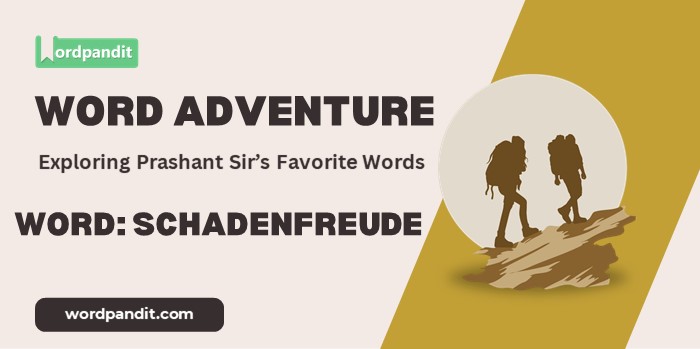Word Adventure: Schadenfreude
CopyThe Headline
"Schadenfreude: The Joy That Dares Not Speak Its Name"
The Scoop
In the vast lexicon of human emotions, some feelings are more socially acceptable than others. 'Schadenfreude' is one of those words that puts a name to an emotion we often feel but rarely admit to. It's a term that's both deliciously specific and universally relatable. Let's embark on a journey to understand this complex emotional response that lurks in the shadows of our psyche.
Let's Break It Down
The Plot Thickens
'Schadenfreude' is a linguistic import from German, where it's been in use since the late 18th century. The word made its way into English in the mid-19th century, filling a lexical gap for a feeling that everyone experiences but few languages explicitly name.
What makes 'schadenfreude' particularly interesting is its moral ambiguity. While most cultures discourage taking pleasure in others' pain, the universality of the emotion suggests it might serve some psychological or social function. Some researchers propose that schadenfreude might help level the playing field in our minds, especially when we perceive the misfortune as deserved or when it happens to someone we envy.
The concept has been explored in literature, philosophy, and psychology. From Nietzsche's musings on it as a childish emotion to contemporary studies on its role in social comparison, schadenfreude continues to fascinate those who seek to understand the complexities of human nature.
Word in the Wild
The Twist
Here's an intriguing aspect of schadenfreude: while we often think of it as a negative trait, some studies suggest it might have positive social functions. For instance, schadenfreude directed at powerful figures who have abused their position might serve as a form of psychological justice, helping to balance our sense of fairness in the world. It's a reminder that even our less noble emotions can play a role in shaping social dynamics and personal resilience.
Make It Stick
Schadenfreude: When someone else's rain cloud becomes your silver lining!
Your Turn
Think about a time when you experienced schadenfreude. What triggered it? How did you feel about your reaction afterwards? Share your schadenfreude stories (anonymously, if you prefer!) in the comments below. Let's explore how this complex emotion plays out in our lives and what it might reveal about human nature!
Down the Rabbit Hole
- Curious about other emotion words borrowed from German? Look into 'angst', 'weltschmerz', or 'gemütlichkeit'.
- Interested in the psychology behind schadenfreude? Research studies on social comparison theory and its relation to this emotion.
- Want to explore literary depictions of schadenfreude? Dive into works by authors like Dostoevsky or Oscar Wilde, who often delve into the darker aspects of human nature.
The Last Word
As we conclude our exploration of 'schadenfreude', I hope you've gained a new appreciation for this complex and somewhat taboo emotion. It serves as a reminder that language can shine a light on the full spectrum of human experience, including the parts we might prefer to keep in the shadows. The next time you feel that guilty little thrill at someone else's mishap, remember – you're not just being a bit naughty, you're experiencing schadenfreude! Until our next word adventure, this is Prashant from Wordpandit, encouraging you to embrace the full complexity of your emotional vocabulary, schadenfreude and all!

